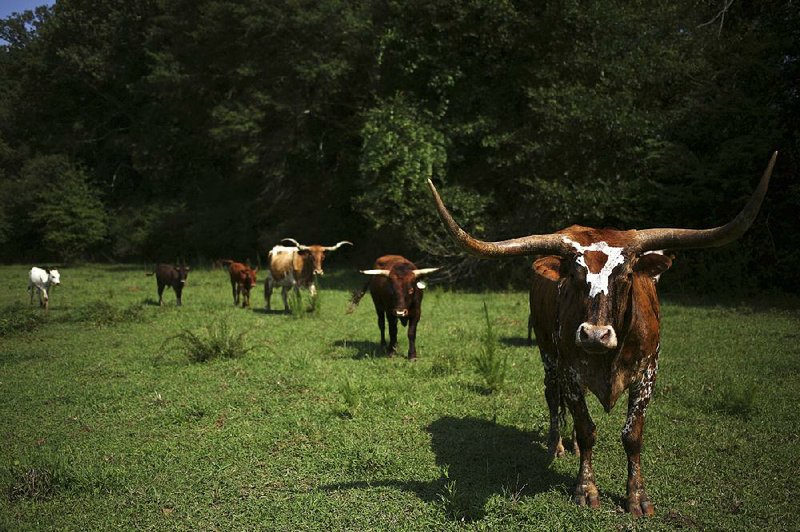The U.S. Cattlemen's Association is urging lawmakers to establish labeling guidelines so shoppers know which products have beef in them and which ones do not.
After recent investments by leading meat producers Tyson Foods and Cargill in new businesses that make meat grown from animal cells and a plant-based product designed to resemble meat, the Cattlemen's Association requested that new guidelines be written.
In a petition, the group contends that the words "beef" and "meat" have been used loosely in advertising to describe products unrelated to farm animals.
As startup companies like Beyond Meat and Memphis Meats expand distribution this year, the association claimed that shoppers are likely to purchase -- if they haven't already -- products with the word "meat" used on the label, when those products are actually derived from plants, insects or animal cells.
The group filed its petition with the U.S. Department of Agriculture's Food Safety and Inspection Service on Friday. The association requested that necessary changes be made to the Food Standards and Labeling Policy Book so that ersatz meat products will be properly labeled.
In the petition, representatives said that labeling practices violate the Federal Trade Commission's "Truth in Advertising" standard and that regulations on when a company can use meat-related terms in its labeling should be in place.
The Cattlemen's Association argued that the words "meat" and "beef" should be used exclusively on packaging for products from animals that have been "born, raised, and harvested in the traditional manner," according to the 14-page document.
So far, there have been no labeling requirements for products presented this way, the group said in the filing.
However, USDA regulations state that "any product for which there is a common or usual name must consist of ingredients and be prepared by the use of procedures common or usual to such products."
To back its claim, the association attached seven different definitions of the words "beef" and "meat" to the filing.
While some defined beef and meat as flesh from animals that have been raised and slaughtered, Oxford Dictionaries and Merriam-Webster left room for interpretation, not specifying whether animals had to be raised or slaughtered to be considered beef or meat.
In an email Monday, a USDA spokesman said the Food Safety and Inspection Service will review the petition "[and] will respond accordingly once all information has been reviewed." The agency did not specify when, or if, the issue will be open to public comment.
Travis Justice, chief economist of the Arkansas Farm Bureau, compared this issue to other food-related cases. One involved the flexibility of the word "milk" in the marketplace. The other involved eggless mayonnaise.
After a civil-action lawsuit filed by Unilever, the U.S. Food and Drug Administration warned food company Hampton Creek that it couldn't use the word "mayo" on its product because it did not contain eggs, as required by the regulatory definition of mayonnaise.
In 2015, the FDA sent a letter to the company saying that the combined use of the word "mayo" and the image of an egg on the product's label was enough to be considered misleading to consumers. Hampton Creek was allowed to use the word after agreeing to make the words "egg-free" larger on the label and to make the logo of a cracked egg smaller.
The filers of Friday's petition are concerned that new competitors offering a substitute product are misleading customers, Justice said.
Beyond Meat, for example, is marketed as plant-based meat.
"So that's a little misleading," Justice said. "You've got the brand name, but are there other descriptors clarifying it?"
The label says there are 20 grams of plant protein per serving in the company's Beyond Burger and that it is plant-based.
Tyson Foods recently invested in Memphis Meats and in Beyond Meat, a company that added its meatless burgers to TGI Friday menus nationwide last month.
Asked Monday whether there had been any customers who ordered a Beyond Burger but expected a beef patty, staff members from the North Little Rock location said there hasn't been any confusion.
Cody Burkham, executive vice president of the Arkansas Cattlemen's Association, said its definition of meat falls in line with the definition adopted by the National Cattlemen's Beef Association, a group that's separate from the organization that filed Friday's petition.
Since alternative protein companies have gained more funding and market share, the beef association passed a resolution to define beef. Burkham said he viewed the market discrepancies as a consumer choice issue.
The National Cattlemen's Beef Association's definition of beef only includes "products derived from actual livestock raised by cattle farmers and ranchers and harvested for human consumption."
The group also opposed alternative proteins on the market that use nomenclature associated with livestock production practices, as well as those that claim to be a substitute or equivalent to the real thing.
Business on 02/13/2018

